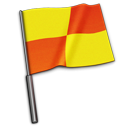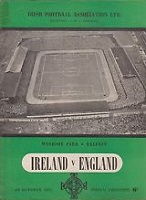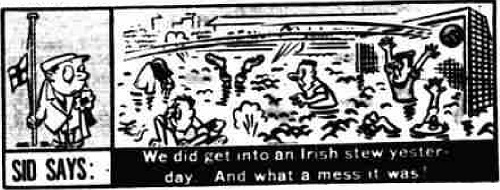|
|
 flg.jpg) "ENGLAND
CAN NEVER BE SO BAD AGAIN" Daily
Mirror "ENGLAND
CAN NEVER BE SO BAD AGAIN" Daily
Mirror |
  Officials
from Scotand Officials
from Scotand |
Ireland |
UK ruling on substitutes |
England |
Referee
(black)
Douglas
Gerrard
39 (10 March 1913), Aberdeen |
|
|
Linesmen |
Arthur Crossan
Edinburgh |
James S.
McIntosh
Ardrossan |
|
|
|
 Ireland
Team Ireland
Team |
| |
|
Rank |
No official ranking system established;
ELO rating 51st to 48th |
Colours |
Green jerseys with white collars,
white shorts, blue socks with green tops. |
Captain
|
Alf McMichael
|
Manager |
Peter Dermot Doherty, 39 (5 June 1913),
appointed October 1951, also player-manager at Doncaster Rovers FC since
June 1949.
Team chosen on Tuesday, 23 September 1952. |
|
Attendance: G. Morgan (Linfield FAC) |
fourth match, W 0 - D - 1 - L 3 - F 2 - A 10. |
 Ireland
Lineup Ireland
Lineup |
|
|
Uprichard, W.
Norman M. |
24
167 days |
20 April 1928 |
G |
Swindon Town FC, England |
4 |
10ᵍᵃ |
|
2 |
Cunningham, William E. |
22
227 days |
20 February 1930 |
RB |
St Mirren FC, Scotland |
2 |
0 |
|
3 |
McMichael, Alfred |
25
3 days |
1 October 1927 |
LB |
Newcastle United FC, England |
9 |
0 |
4
 |
Blanchflower, R.
Dennis |
26
237 days |
10 February 1926 |
RHB |
Aston Villa FC, England |
7 |
0 |
|
5 |
Dickson, William |
29
203 days |
15 March 1923 |
CHB |
Chelsea FC, England |
6 |
0 |
|
6 |
McCourt, Francis J. |
26
300 days |
9 December 1925 |
LHB |
Manchester City FC, England |
3 |
0 |
|
7 |
Bingham, William L. |
21
60 days |
5 August 1931 |
OR |
Sunderland AFC, England |
5 |
0 |
|
8 |
D'Arcy, Seamus D. |
30
295 days |
14 December 1921 |
IR |
Chelsea FC, England |
2 |
0 |
|
9 |
McMorran,
Edward J., injured off first
half, returned second half |
29
32days |
2 September 1923 |
CF |
Barnsley FC, England |
8 |
1 |
|
10 |
McIlroy, James |
20
345 days |
25 October 1931 |
IL/CF |
Burnley FC, England |
4 |
0 |
11
  |
Tully, Charles P. |
28
85 days |
11 July 1924 |
OL |
The Celtic FC, Scotland |
4 |
2 |
|
reserve: |
Billy Neill (Glentoran FC) |
|
team notes: |
Eddie
McMorran was off the field for twenty minutes when Ireland took the
lead. He had eight stitches for a head wound following a 'violent collision'
with Jimmy Dickinson. Norman Uprichard was also debilitated by a
shoulder injury suffered in the first half.
Tully's two goals were
the first goals scored under the Doherty era. |
|
Manager Peter Doherty played for Ireland against England on seven
separate occasions from 1935 until 1947, scoring one in 1947. |
|
The
Ireland team were set up in Bangor using the Ards ground to train on. |
|
|
|
2-3-5 |
Uprichard -
Cunningham, McMichael -
Blanchflower,
Dickson, McCourt -
Bingham, D'Arcy, McMorran, McIlroy, Tully
notes: Jimmy McIllroy played in the centre
whilst McMorran was receiving attention for his injury |
|
Averages: |
Age |
25 years 345 days |
Appearances/Goals |
4.9 |
0.1 |
|
|
|
flg.jpg) England
Team England
Team |
| |
|
Rank |
No official ranking system established;
ELO rating 4th to 5th |
Colours |
The 1949 home
uniform -
White collared short-sleeved jerseys, blue shorts, red socks.
|
|
P 26th of 43, W 15 - D 6 - L 5 - F
68 - A 37.⁴³ |
|
Captain |
Billy Wright |
Manager |
Walter Winterbottom, 39 (31 March 1913), appointed as FA national director of coaching/team manager on 8 July 1946; |
|
record 29th of 90, W 18 - D 5 - L 6 - F 70 - A 36. |
Trainer: Jimmy Trotter (Charlton Athletic FC) |
P 47th of 139, W 31 - D 9 - L 7 - F 139 - A 55. |
|
|
Team chosen by Selection Committee headed by Arthur Oakley, on Wednesday, 24
September, before the inter-league match in Wolverhampton.
|
|
|
 ³ ³ |
|
|
flg.jpg) England
Lineup England
Lineup |
|
|
one
change
to the previous match
(Elliott>Allen) |
league positions
(24 September) |
|
|
|
Merrick, Gilbert H. |
30
252 days |
26 January 1922 |
G |
Birmingham City FC
(FL2 5th) |
7 |
8ᵍᵃ |
|
2 |
Ramsey, Alfred E. |
32
256 days |
22 January 1920 |
RB |
Tottenham Hotspur FC
(FL 14th) |
23 |
1 |
|
3 |
Eckersley, William |
27
80 days |
16 July 1925 |
LB |
Blackburn Rovers FC (FL2 14th) |
9 |
0 |
4
 |
Wright, William A. |
28
241 days |
6 February 1924 |
RHB |
Wolverhampton
Wanderers FC (FL 5th) |
44 |
3 |
|
most apps 1952 |
5
 |
Froggatt, Jack |
29
322 days |
17 November 1922 |
CHB |
Portsmouth FC (FL
11th) |
9 |
1 |
|
6 |
Dickinson, James
W.,
injured off between 30th-40th minutes |
27
163 days |
24 April 1925 |
LHB |
Portsmouth
FC (FL 11th) |
21 |
0 |
|
7 |
Finney,
Thomas |
30
182 days |
5 April 1922 |
OR |
Preston
North End FC (FL 10th) |
40 |
20 |
|
the third player to reach this 40-app milestone |
|
8 |
Sewell, John |
25
254 days |
24 January 1927 |
IR |
Sheffield Wednesday FC
(FL 18th) |
4 |
2 |
9
 |
Lofthouse, Nathaniel |
27
38 days |
27 August 1925 |
CF |
Bolton Wanderers FC
(FL 20th) |
9 |
10 |
|
10 |
Baily, Edward F. |
27
59 days |
6 August 1925 |
IL |
Tottenham Hotspur FC
(FL 14th) |
9 |
5 |
|
final app 1950-52 |
11
 |
Elliott, William H. |
27
198 days |
20 March 1925 |
OL/
LHB |
Burnley FC (FL 3rd) |
3 |
1 |
|
reserves: |
Tommy Garrett (Blackpool FC (FL 2nd)) and
Willie Watson (Sunderland AFC (FL
8th)).
Joe Kennedy (West Bromwich Albion
FC (FL 4th)) replaced Garrett on Monday, 29 September. Garrett was hurt in his
club's league match against Charlton Athletic FC the previous
Saturday. |
|
team notes: |
Jimmy Dickinson
leaves the field after a collision with Eddie McMorran. |
|
records: |
This draw equals the post-war unbeaten record. England have gone
eleven games without loss, a record also set between 1947-48. |
|
The English team were set up in Bangor prior to the match. |
|
|
|
2-3-5 |
Merrick -
Ramsey, Eckersley -
Wright, Froggatt,
Dickinson -
Finney, Sewell, Lofthouse, Baily, Elliott
notes: Billy Elliott dropped back into the
left-half position whilst Dickinson was receiving treatment |
|
Averages: |
Age |
28 years 221
days |
Appearances/Goals |
16.2 |
3.7 |
|
|
|
|
Match Report by
Mike Payne |
|
 After
England had done so well on their summer tour, the match in Northern
Ireland seemed to be only a formality for their experienced players. But,
if that was what they were thinking, they were in for a rude awakening. After
England had done so well on their summer tour, the match in Northern
Ireland seemed to be only a formality for their experienced players. But,
if that was what they were thinking, they were in for a rude awakening.
Indeed, Ireland came
so desperately close to pulling off a famous victory and only a very late
goal saved England.
There had been no
hint of the impending drama when the record crowd of 60,000 saw England
snatch the lead after only ninety seconds. Billy Wright split the Irish
defence with a superb long through ball which found Nat Lofthouse, the
current 'Golden Boy' of English football. He hit a firm shot wide of the
advancing Uprichard to open the scoring.
It set the match up for
its seemingly inevitable defeat for the Irish. After all, they had not
beaten England since 1927 and results between the countries had taken on a
somewhat monotonous similarity.
But this day was somehow different.
Soon the powerful Blanchflower and McCourt began to impose their
superiority on to the likes of Jackie Sewell and Eddie Baily and suddenly
England found the going somewhat tricky.
Bingham and Tully were
giving the England full-backs a torrid time with their speed and trickery
and it was no more than Ireland deserved when they gained an equaliser on
15 minutes.
Tully, whose footwork kept causing England problems,
forced a corner on the left. He took the kick and it curled wickedly in
towards Alf Ramsey, who was stood at the near post. The Spurs full back
ducked under the ball, fully expecting Gil Merrick to gather safely.
Unfortunately, by the time the goalkeeper reacted, the ball was in the
net. It was Ireland's first goal for 18 months and, although bizarre, it
was none the less very welcome.
Three nasty injuries added to the
list of incidents gradually building up. First Uprichard was injured
following a collision with Billy Elliott but he bravely carried on after
treatment. Then a nasty clash of heads between McMorran and Jimmy
Dickinson ended with both players going off for stitches.
Dickinson
was back ten minutes afterwards but McMorran was off until well into the
second half. But Ireland were undaunted and a minute after half-time they
took the lead amidst unparalleled excitement.
A free-kick by
McMichael was flicked on by Blanchflower's head straight to Tully, again,
who made no mistake shooting past the partially unsighted Merrick. The
crowd sensed that a victory was really possible. McMorran bravely came
back on, typifying the Irish spirit and he very nearly wrapped the game
up, only to be foiled by a fine save from Merrick.
 To England's
credit they refused to go completely under and, with Wright and Dickinson
once again worked tirelessly, they clawed their way back as the game
reached its climax. Sewell, Lofthouse and Elliott all went close before,
with only three minutes left, they found an equaliser. To England's
credit they refused to go completely under and, with Wright and Dickinson
once again worked tirelessly, they clawed their way back as the game
reached its climax. Sewell, Lofthouse and Elliott all went close before,
with only three minutes left, they found an equaliser.
Jack decided
to push his weight forward to help his attack. His pass found Tom Finney,
a flick on to Wright and back to Froggatt. The Portsmouth player
powerfully beat McCourt before putting over a perfect centre which Elliott
headed home firmly.
The drama had been incredible and although the
match was never a classic, it certainly had plenty of incident.
|
|
Match Report by
Norman Giller |
|
Nat
Lofthouse scored in the first minute and Billy Elliott in the last minute
of a dramatic match. Sandwiched in between was the magic of Celtic ball
artist Charlie Tully, who scored twice for Ireland. He beat Merrick from
25 yards and then with his specialist inswinging corner-kick after the
Irish team had been reduced by injury to ten men (In a game for Celtic
against Falkirk Tully netted direct from a corner and was ordered to
re-take it because the referee was not ready. He immediately repeated the
trick and put the ball in the exact same spot in the net!). Northern
Ireland, urged on by a record 60,000 Windsor Park crowd, had two young
midfield partners called Danny Blanchflower and Jimmy McIlroy dictating
the pace and the pattern of the match. They were on the verge of their
first victory over England since 1927 when Elliott silenced the
celebrating fans with an equalising header in the desperate closing
moments. Billy Wright and Jimmy Dickinson were the match stars for
England, steadying the ship with their cool defensive work when the Irish
threatened to take a stranglehold on the game. Team manager Walter
Winterbottom was furious over the goal that Charlie Tully scored direct
from a corner-kick. Charlie was famous for his in-swinging corners, and
England had worked at cutting them out in training by placing Alf Ramsey
on the near post and then centre-half Jack Froggatt directly behind
goalkeeper Gil Merrick. The corner from which he scored was curling
towards Ramsey, who suddenly ducked under the ball. Gil reached out but
only caught thin air as the ball swung into the net. Alf said later that
he thought Gil had shouted "mine", but it had apparently been one of the
Irish forwards. The crowd went berserk when the ball hit the net. And no
wonder - it was Northern Ireland's first international goal for eighteen
months!
|
|
Match Report
as appears in the F.A. Yearbook 1953-54, page 20 |
|
After England's successful visits to
Italy and Austria in the summer of 1952 it may have seemed that she had
few problems when the 1952-53 international season began with the match
against Ireland in Belfast. The team that defeated Austria 3-2 in Vienna
in May was picked without change. Ireland made only two changes from the
side that lost to Wales in March. Cunningham was brought in for Graham and
Tulley for Lockhart.
England had the narrowest of escape in years. Only
a goal by Elliott from Froggatt's centre, after the centre-half had made a
great run down the right wing, denied the Irishmen victory over England
they have awaited since 1927.
No-one would have begrudged them their
victory. The England side was faced by the opponents who were quicker on
the ball, fiercer in the tackle, and driven on by a great team spirit.
Weaknesses showed themselves in the England forward line, the ball rarely
coming across for Lofthouse to use his great gifts in front of goal.
It
was he who put England ahead after only 90 seconds, but Ireland soon
fought level. Tully, who had a great game on the left wing, scored direct
from a corner-kick after 15 minutes. It was Ireland's first goal for
eighteen months.
For 20 minutes after this they were without their
centre-forward, McMorran, off with a bad cut over his right eye. And it
was with only 10 men that Ireland took the lead a minute after the
interval. A free-kick by McMichael, a header by Blanchflower, and Tully
again did the trick. They were in sight of a well-deserved victory when
Froggatt made his sortie and Elliott headed the ball home clean as a
whistle.
|
In
Other News....
|
It was on 4 October 1952 that a fishing trawler from Hull ran
aground off the coast of Greenland. Twenty men drowned and
only 19-year-old Norman Spencer managed to clamber onto a rock
to survive, where he stayed for ten hours until the fog
cleared and he was rescued. |
|
34,505 were at Headingley in Leeds to watch Great Britain
beat Australia, 19-6, in the first test match for the rugby
league Ashes Cup. Five weeks later, the home side clinched
the trophy by beating them again at Swinton. |
|
|
|
|
|
|
Source Notes |
TheFA.com
Original newspaper reports
Northern Ireland's Footballing Greats
Drew Herbertson, Scottish FA historian |
|
Rothman's Yearbooks
Mike Payne's England: The Complete Post-War Record
Norman Giller, Football Author
British Pathé |
|
|
cg |


